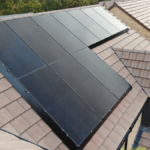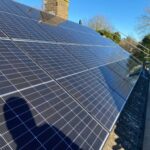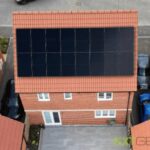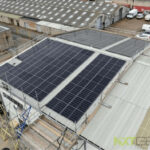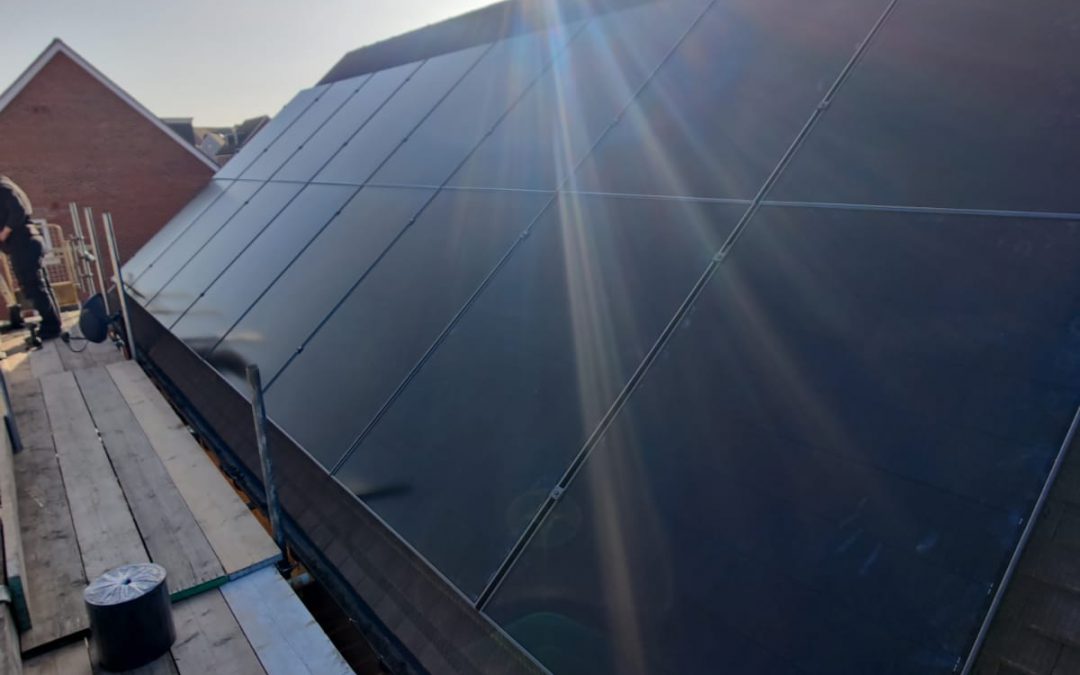


Solar energy has become a popular and sustainable choice for UK homeowners and businesses alike. However, the efficiency of solar panels can vary significantly throughout the year due to changes in sunlight intensity and duration. By understanding these seasonal fluctuations in the UK and implementing appropriate strategies, you can maximize your solar panel system’s performance and reap the full benefits of clean, renewable energy.
Seasonal Factors Affecting Solar Panel Efficiency
The primary factors influencing solar energy production are:
Sunlight intensity
The amount of sunlight reaching the Earth’s surface varies throughout the year due to the Earth’s tilt and its orbit around the Sun, which is where we get our seasons from.
Sunlight duration
The number of daylight hours also varies, with longer days in the summer and shorter days in the winter due to seasonal changes of the Earth’s rotation around the sun. The longest day (Summer Solstice) is about June 20th or June 21st and the shortest day (Winter Solstice) is about December 20th or December 21st in the UK.
Seasonal Strategies for Maximizing Solar Panel Efficiency
Spring Season
As the daylight hours slowly increase and the Sun’s angle rises, solar energy production begins to rise slightly. However, spring also brings challenges like pollen, dust, and potential rainfall which can impact your solar energy production. Regular cleaning of your solar panels is essential to maintain optimal solar panel efficiency.
Summer Season
Summer often brings abundant sunlight and high temperatures in the UK. While high temperatures can very slightly reduce solar panel efficiency by a few percent, proper ventilation can help mitigate this impact. Consider adjusting the tilt angle of your solar panels to maximize sunlight exposure during the summer months.
Autumn Season
As daylight hours slowly decrease and the Sun’s angle lowers in the sky, solar energy production begins to decline in the UK. However, autumn’s milder temperatures can slightly improve solar panel efficiency compared to the summer season. Adjusting the tilt angle of your solar panels and ensuring they are not shaded by trees or other obstructions can help optimize solar energy production.
Winter Season
Winter presents the greatest challenges for solar energy production in the UK due to short days, low sunlight angles, and potential snow and ice accumulation. While cold temperatures do not harm solar panels, snow and ice can significantly reduce efficiency when they cover the solar panels. Consider installing panels at a steeper angle to minimize snow build-up and regularly clear snow and ice from the panels in the winter season.
Additional Tips for Year-Round Solar Panel Efficiency
- Regular maintenance: Regular cleaning and inspections can help identify and address any issues that may be affecting your solar panel system’s performance.
- Professional installation: Ensure that your solar panels are installed correctly to maximize efficiency and minimize shading. Use an MCS Certified Solar PV (Panels) Installer like NXTGEN Energy.
- Consider a solar battery: A solar battery can store your excess solar energy generated during sunny periods for use during less sunny times or at night. Battery Storage is a good investment with 0% VAT at the moment.
By implementing these strategies and staying informed about seasonal factors, you can optimize the performance of your solar panel system and enjoy the benefits of clean, renewable power throughout the year in the UK.
Are you considering getting Solar Panels?
If you are a UK homeowner considering installing solar panels, get in touch with us today! The solar energy experts here at NXTGEN Energy will be more than happy to help you on your Solar journey. We are also able to discuss alternative types of green energy products, just in case a solar PV system isn’t suitable for your home! Call us on 01268 928 690 or simply click ‘Learn More’ below to fill out our short form, to get connected to a Solar Energy Expert.
FAQ: Optimizing Solar Panel Efficiency Throughout the Year
You might also be interested in…
- Solar Panels: Pros, Cons, and Whether They’re Worth ItSolar panels can cut your energy bills by up to 70%, and surplus electricity can be sold back to the National Grid through the Smart Export Guarantee (SEG) Scheme. They reduce your carbon footprint, require minimal maintenance, and can last over 30 years, making them a long-term eco-friendly investment. Upfront costs are… Read more: Solar Panels: Pros, Cons, and Whether They’re Worth It
- 8 Facts About Solar Energy That May Surprise YouAbundant Energy: The Earth gets enough sunlight yearly to power us for 20,000 years. It’s renewable & clean. Innovative History: Solar energy’s roots include discoveries by scientists like Becquerel & Einstein. Economic & Green Impact: Solar is cheaper than fossil fuels, lowers emissions & creates thousands of jobs. UK Solar Growth:… Read more: 8 Facts About Solar Energy That May Surprise You
- Understanding Solar Panel EfficiencySolar panels convert sunlight to electricity through photovoltaic cells, storing extra energy for later use. There are three main types of solar panels: monocrystalline, polycrystalline, and thin-film. Monocrystalline panels lead in efficiency (20%+), but new technologies are improving performance continuously. Solar panels save money, boost property value & reduce environmental impact,… Read more: Understanding Solar Panel Efficiency
- Are Brits Turning Their Backs on Solar Panels?High upfront costs: Deter many Brits from installing solar panels despite falling prices & financing options. Myths debunked: Solar panels work in cloudy weather, need minimal maintenance & can last 25–30 years. Financial & Environmental benefits: Solar panels cut electricity bills by up to 70% & lower carbon footprints. Government support… Read more: Are Brits Turning Their Backs on Solar Panels?
- Are solar panels worth it? NXTGEN Energy’s guide to getting startedInstalling solar panels can significantly reduce electricity bills, with prices dropping in recent years. Solar panels are a good investment for those with the space, daytime electricity usage & a south-facing roof. Consider financing options carefully, as borrowing can be expensive; paying outright provides better returns. Solar batteries store energy for… Read more: Are solar panels worth it? NXTGEN Energy’s guide to getting started
- The History of Solar EnergyAncient Use: Early civilizations used the sun for heating and cooking. Early Innovations: Key 16th-17th century discoveries laid the groundwork for solar technology. 20th Century Breakthroughs: Notable advancements included practical photovoltaic cells & solar in space. Modern Expansion: Solar energy has become efficient and widespread in the 21st century. The history… Read more: The History of Solar Energy
- How Solar Panels Increase Property ValueSolar panels can boost your home’s value by an average of £2,000 & command a price premium of 0.9% to 2%. Homes with solar panels have better EPC ratings, which can increase property value by up to 14%. Eco-friendly homes are in high demand, making solar-powered homes more attractive to buyers. … Read more: How Solar Panels Increase Property Value
- Did You Know That Solar Costs Have Fallen by 82%?Solar panel costs have dropped by 82% since 2010, making solar energy more accessible for UK homeowners. Factors to consider before switching to solar include initial investment, energy savings, and roof suitability. Government incentives, such as the Smart Export Guarantee (SEG) scheme, can help offset the initial costs. NxtGen Energy offers… Read more: Did You Know That Solar Costs Have Fallen by 82%?
- Advantages of Solar Energy in 2025Reduces carbon emissions & improves air quality by producing clean, renewable energy. Lowers electricity bills and provides long-term financial benefits for homeowners & businesses. UK government incentives, like the Smart Export Guarantee, make solar adoption more attractive. Expands workforce opportunities & boosts local economies through investments in the solar energy sector.… Read more: Advantages of Solar Energy in 2025
- Solar Panels in Essex. Are they worth it? [2025]Solar panels can save Essex homeowners £300-£500 annually on electricity bills due to decent sunshine hours. The Smart Export Guarantee (SEG) tariff offers additional income for excess electricity exported to the Grid. Initial installation costs range from £4,500 to £8,500, but government grants can help reduce this expense. . Free no-obligation… Read more: Solar Panels in Essex. Are they worth it? [2025]
- What are the best SEG tariffs? [February 2025]Best SEG tariffs at a glance The best SEG tariff in February 2025 is Solar Savings Exclusive from Good Energy. Energy companies offer the best SEG tariffs to their own customers in February 2025. The highest SEG tariff pays 40p per kWh – if you meet the qualifying conditions. The best… Read more: What are the best SEG tariffs? [February 2025]
- Why Manufacturing & Logistics Businesses need to invest in Warehouse Solar Panels [2025]Commercial Solar Panels can reduce energy bills & enhance financial output for manufacturing & logistics businesses. Large, flat, metal warehouse roofs are ideal for installing commercial solar panels, which can maximize solar exposure. Although solar panels require initial investment & maintenance, they reduce energy costs & generate additional revenue. Installing solar… Read more: Why Manufacturing & Logistics Businesses need to invest in Warehouse Solar Panels [2025]


 Optimizing Solar Panel Efficienc...
Optimizing Solar Panel Efficienc...


